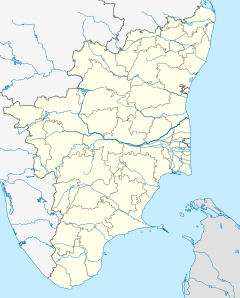| Veeraraghava Swamy Temple | |
|---|---|
 | |
| Religion | |
| Affiliation | Hinduism |
| District | Tiruvallur |
| Deity | Sri Veeraraghava Swami (Vaidhya Veera Raghava Swami) (Vishnu)[1] Kanakavalli Thayar (Vasumathi) |
| Festivals | Vaikunta Ekadasi, Ammavasai |
| Features |
|
| Location | |
| Location | Tiruvallur |
| State | Tamil Nadu |
| Country | |
Veeraraghava Swamy Temple, Tiruvallur, Tamil Nadu | |
| Geographic coordinates | 13°08′35.8″N 79°54′24.2″E / 13.143278°N 79.906722°E[1] |
| Architecture | |
| Type | Dravidian architecture |
| Creator | Pallavas, Cholas, Thanjavur Nayaks |
| Elevation | 67.47 m (221 ft) |
| Website | |
| http://svdtiruvallur.org | |
| Part of a series on |
| Hinduism |
|---|
 |
This article should specify the language of its non-English content, using {{lang}}, {{transliteration}} for transliterated languages, and {{IPA}} for phonetic transcriptions, with an appropriate ISO 639 code. Wikipedia's multilingual support templates may also be used. (November 2021) |
Veeraraghava Swamy Temple (or Veerarghavaswamy Temple) is a temple dedicated to the Hindu god Vishnu, located in Tiruvallur, Chennai Metropolitan City, an area and headquarters in Tiruvallur district in the South Indian state of Tamil Nadu. Constructed in Dravidian style of architecture, the temple is glorified in the Divya Prabandham, the early medieval Tamil canon of the Alvar saints from the 6th–9th centuries CE. It is counted as one among the 108 Divya Desams dedicated to Vishnu. Vishnu is worshipped as Veeraraghava Perumal, and his consort Lakshmi as Kanakavalli Thayar.
The temple is believed to be of significant antiquity and is believed to be initiated by the Pallavas of the late 8th century CE, with later contributions at different times from Thanjavur Nayaks. The temple has three inscriptions dating from the Chola period. The temple has a seven-tiered rajagopuram (gateway tower) and enshrined within a granite wall. The complex contains all the shrines and Hritayathabhanasini, the temple tank, is located to the west of the temple. A Goshala (cow shed) is maintained by the temple administration.
Veeraraghava Perumal is believed to have appeared to marry his consort Lakshmi in the place. The temple observes six daily rituals and three yearly festivals. The chariot festival and float festival, celebrated during the Tamil month of Chittirai (March–April), is the most prominent festival of the temple. The jeers of Sri Ahobila Matha are the hereditary trustees. The temple is maintained and administered by the Ahobila Matha.
- ^ K.V., Raman; T., Padmaja (1995). Indian Epic Values: Rāmāyaṇa and Its Impact : Proceedings of the 8th International Rāmāyaạ Conference. Peeters Publishers. p. 86. ISBN 9789068317015.
